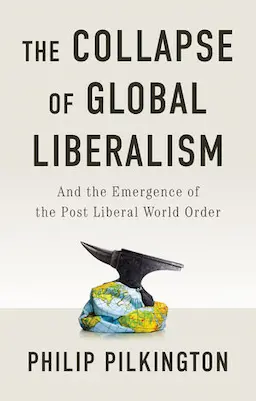
Book Bits: 28 June 2025

By purchasing books through this site, you provide support for The Capital Spectator’s free content…● The Collapse of Global Liberalism: And the Emergence of the Post Liberal World Order Philip Pilkington Summary via publisher (Wiley) In the 1990s, a vision emerged of a frictionless world of …
 ● The Collapse of Global Liberalism: And the Emergence of the Post Liberal World Order
● The Collapse of Global Liberalism: And the Emergence of the Post Liberal World Order
Philip Pilkington
Summary via publisher (Wiley)
In the 1990s, a vision emerged of a frictionless world of globalization in which the West would become ever richer on the basis of a tech-based service economy, all underpinned by a rules-based liberal international order. It became the basis for the mainstream politics of centre-left and right. Philip Pilkington argues that this vision was always delusional and is now dying. It is based on a doctrinaire and unrealistic form of liberalism and has given rise to hollowed-out financialised economies and disintegrating societies that can barely even reproduce their population or meet their energy needs. The US and UK find themselves ill-equipped to compete with China and other non-liberal states within an emerging post-liberal order in which what really matters is industrial capacity, realpolitik and military strength. Only by abandoning our liberal delusions and advancing our own brand of hard-headed post-liberalism can the West survive.
 ● The World Under Capitalism: Observations on Economics, Politics, History, and Culture
● The World Under Capitalism: Observations on Economics, Politics, History, and Culture
Branko Milanovic
Summary via publisher (Polity)
Branko Milanovic is best known as one of the world’s leading experts on global inequality. But he is also an unusually wide-ranging and penetrating commentator on subjects across economics and beyond, in politics, history, and culture. This book brings together his most searching, provocative, and entertaining articles of recent years, providing an abundance of vital insights into the evolution and dynamics of the world under capitalism.
 ● Breaking the Engagement: How China Won & Lost America
● Breaking the Engagement: How China Won & Lost America
David Shambaugh
Review via The Cipher Brief
David Shambaugh’s newest book Breaking the Engagement: How China Won and Lost America chronicles the rise and fall of US “engagement” with the People’s Republic of China over the past five decades… Shambaugh makes his own position very clear: “Engagement strategy has failed miserably” and is “D-E-A-D.” In his view, it was based on American naiveté about China’s strategic intentions and an idealistic belief that the United States over time could shape China into a liberal democracy. Both of these were fatally undermined by the rise of Xi Jinping, who instead has made China more repressive at home and more illiberal and coercive abroad. Shambaugh thus welcomes the eclipse of the engagement debate by the debate over how to deal with Xi’s China.
 ● Power Corrupts: Cleaning Up America’s Biggest Industry
● Power Corrupts: Cleaning Up America’s Biggest Industry
Richard Munson
Summary via publisher (Bloomsbury)
Electric utilities have faced a few scandals over the past century or so, but corruption is growing as the power industry’s conventional business model is falling apart. Modern technologies challenge their monopoly mindsets and outmoded generators. Threatened utilities, in turn, gun for taxpayer- and ratepayer-funded subsidies, which they increasingly seek through fraud-filled, underhanded schemes. Corruption, however, can be challenged. In Power Corrupts: Cleaning Up America’s Biggest Industry, Richard Munson reports on blocked bailouts and options for increased transparency and ethics by exploring well-known scandals that have dominated headlines about the energy sector.
Please note that the links to books above are affiliate links with Amazon.com and James Picerno (a.k.a. The Capital Spectator) earns money if you buy one of the titles listed. Also note that you will not pay extra for a book even though it generates revenue for The Capital Spectator. By purchasing books through this site, you provide support for The Capital Spectator’s free content. Thank you!
Author: James Picerno
